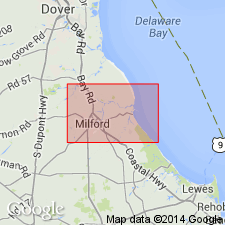
- Usage in publication:
-
- Lynch Heights Formation
- Modifications:
-
- Named
- Dominant lithology:
-
- Sand
- Gravel
- Silt
- AAPG geologic province:
-
- Atlantic Coast basin
Summary:
Lynch Heights, a new formation, is described here as a heterogeneous unit composed of light gray to brown to light yellowish brown, medium to fine sand with discontinuous beds of coarse sand, gravel, silt, fine to very fine sand, and organic-rich clayey silt to silty sand. Small-scale cross-bedding common in sands. Some burrowing in finer sediments. Sands are quartzose and slightly feldspathic. Type section designated as Lf21-19. Reference sections are Le14-18, Le25-12, and boring Lf53-a. Maximum thickness 50 ft in the east; thins westward. Unconformably underlies Scotts Corners Formation (new) and unconformably overlies the Columbia, St. Marys, and Choptank Formations. Contains unique pollen assemblage. Mapped as unnamed Delaware Bay deposits by Ramsey and Schenck (1990). Interpreted to be a fluvial to estuarine unit of fluvial channel, tidal flat, tidal channel, beach, and bay deposits. Age is late Pleistocene.
Source: GNU records (USGS DDS-6; Reston GNULEX).
- Usage in publication:
-
- Lynch Heights Formation
- AAPG geologic province:
-
- Atlantic Coast basin
Ramsey, K.W., 1997, Geology of the Milford and Mispillion River quadrangles, with a contribution on palynology by J.J. Groot: Delaware Geological Survey Report of Investigations, no. 55, 40 p.
Summary:
[Not synopsized to date.]
Source: NA
- Usage in publication:
-
- Lynch Heights Formation
- AAPG geologic province:
-
- Atlantic Coast basin
Ramsey, K.W., 2010, Stratigraphy, correlation, and depositional environments of the middle to late Pleistocene interglacial deposits of southern Delaware: Delaware Geological Survey Report of Investigations, no. 76, 43 p.
Summary:
Pg. 7+. Lynch Heights Formation of Delaware Bay Group. [Not synopsized to date. See also Ramsey, K.W., 2010, Geol. map Georgetown quadrangle, Delaware Geol. Survey, Geol. Map Ser., no. 15, scale 1:24,000, and references therein.]
Source: NA
For more information, please contact Nancy Stamm, Geologic Names Committee Secretary.
Asterisk (*) indicates published by U.S. Geological Survey authors.
"No current usage" (†) implies that a name has been abandoned or has fallen into disuse. Former usage and, if known, replacement name given in parentheses ( ).
Slash (/) indicates name conflicts with nomenclatural guidelines (CSN, 1933; ACSN, 1961, 1970; NACSN, 1983, 2005, 2021). May be explained within brackets ([ ]).

